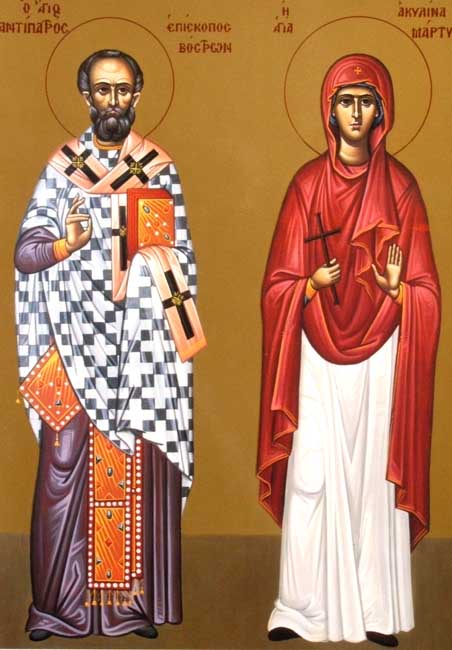She is the daughter of one of the notables of Byblos, Phoenicia (Lebanon). Saint Aquilina lived in the late third century during the reign of King Diocletian. She was taught the principles of Christianity and was baptized by Otalius, the bishop of her city of Byblos. Her heart was inflamed with love for the Divine Child when she was twelve years old. She began to spread His worship among her citizens, and a large number of them believed. Nicodemus, a zealot against paganism, denounced her to the Roman governor Volusinas, who summoned her and asked her about her faith. She replied, “I am a Christian.”
Saint Aquilina lived in the late third century during the reign of King Diocletian. She was taught the principles of Christianity and was baptized by Otalius, the bishop of her city of Byblos. Her heart was inflamed with love for the Divine Child when she was twelve years old. She began to spread His worship among her citizens, and a large number of them believed. Nicodemus, a zealot against paganism, denounced her to the Roman governor Volusinas, who summoned her and asked her about her faith. She replied, “I am a Christian.”
The ruler became angry and began to threaten her to make her disbelieve in Christ, but she did not pay attention to him. So he ordered the soldiers to slap her on the face, then flog her severely until her blood flowed. They asked her, while she was lying in a sea of blood, to disbelieve in Christ, so that she could live. But she answered with nothing but her blood shed for Christ.
When the governor saw her steadfast in her faith, he ordered hot iron rods to be inserted into her thin body. She fell to the ground unconscious. They thought that their victim was dead, so they carried her and threw her outside the city in the garbage dump. An angel from the Lord came and bandaged her wounds, healed her, and led her to the governor's house. She entered the governor's house stealthily, despite the guards around it. She reached the boudoir of Volusianus. Suddenly, he woke up to find her before him. He was terrified and called the guards. He thought that there was magic involved. He threw her into prison. The next morning, he ordered her head to be cut off. The executioner entered and found her dead.
Thus she attained the crown of martyrdom in the year 293 (some believe 298 AD). God performed many miracles at her grave. News of her holiness soon spread throughout the Roman Empire, and her relics were later transferred to Constantinople, where a large cathedral was built in her name. The church celebrates her feast day on June 13.
Your ewe, O Jesus, cries out to you with a loud voice, saying: O my Bridegroom, I long for you, and I strive to seek you, and I am crucified and consumed with you in your baptism, and I suffer for you so that I may reign with you, and I die for you so that I may live through you, but as a spotless sacrifice you accept who was sacrificed to you with longing, so through her intercessions, since you are merciful, save our souls.


